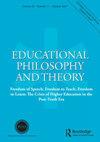Somatic multiplicities: The microbiome-gut-brain axis and the neurobiologized educational subject
IF 1.8
4区 教育学
Q2 EDUCATION & EDUCATIONAL RESEARCH
引用次数: 0
Abstract
Abstract Therapeutic translations of the microbiome-gut-brain (MGB) axis are reconstructing the educational subject in a manner amenable to Foucauldian analysis. Yet, at the same time, under the sway of MGB research social scientists are taking a biosocial turn that threatens the integrity of Foucault’s historicizing philosophical project. Meeting that challenge head-on, this article argues that the MGB axis augments the neurobiological constitution of the educational subject by means of a dietetic mode of subjectivation. Absent a pedagogical element, there is a hollowness to critical academics’ claims that holobiontic self-conceptions springing from the axis can elicit a resistant subjectivity. Though wild pedagogies might inform a resistant tactics of the self, contemporary self-technologies are – as Foucault has taught us – a pale shadow of the ancient Greek conception of dietetics as an holistic, embodied and ensouled practice. At the intersection between the disciplinary apparatuses of criminology and education, therefore, the MGB-driven biosocial turn unambiguously reinforces the social control function of schooling.躯体多样性:微生物组-肠-脑轴和神经生物学教育主题
本文章由计算机程序翻译,如有差异,请以英文原文为准。
求助全文
约1分钟内获得全文
求助全文
来源期刊

Educational Philosophy and Theory
EDUCATION & EDUCATIONAL RESEARCH-
CiteScore
4.20
自引率
15.00%
发文量
171
期刊介绍:
Educational Philosophy and Theory publishes articles concerned with all aspects of educational philosophy. It will also consider manuscripts from other areas of pure or applied educational research. In this latter category the journal has published manuscripts concerned with curriculum theory, educational administration, the politics of education, educational history, educational policy, and higher education. As part of the journal''s commitment to extending the dialogues of educational philosophy to the profession and education''s several disciplines, it encourages the submission of manuscripts from collateral areas of study in education, the arts, and sciences, as well as from professional educators. Nevertheless, manuscripts must be germane to the ongoing conversations and dialogues of educational philosophy.
 求助内容:
求助内容: 应助结果提醒方式:
应助结果提醒方式:


